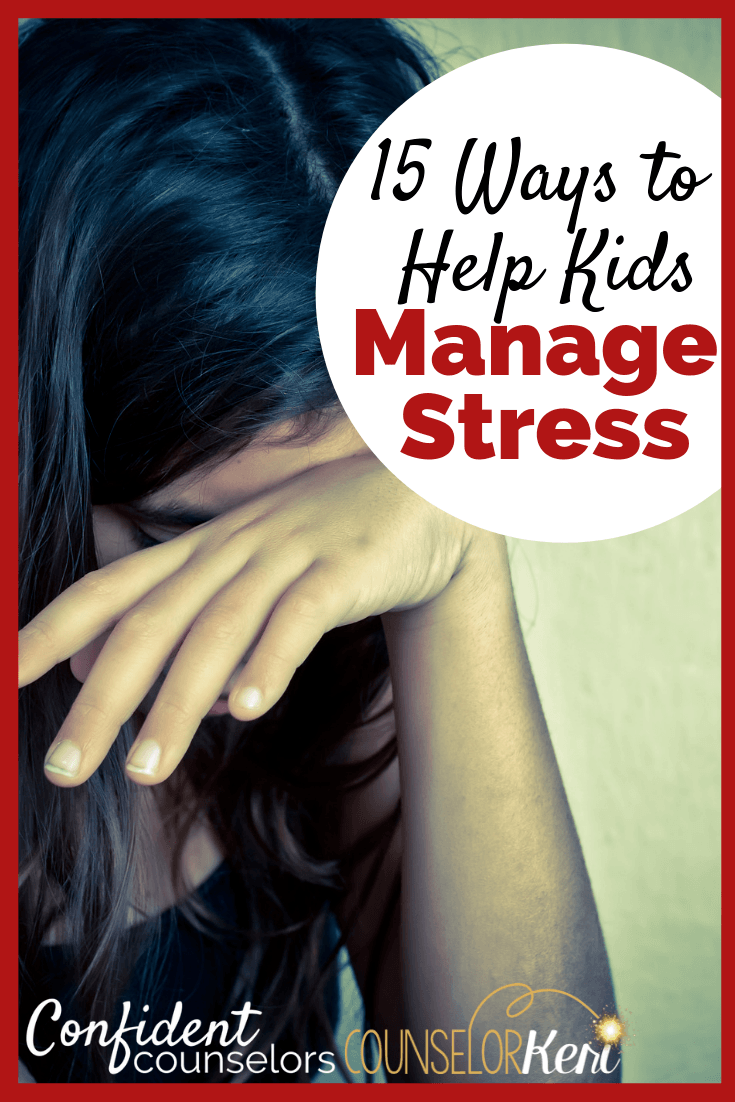During the second quarter of the school year, I started talking to my seventh graders about stress. We did a simple self-assessment and nearly all of my students were reporting high levels of stress about things like school work and interpersonal problems. This is of course not unique to my students. According to a study from the APA, students are more stressed out than ever, reporting levels of stress higher than those of adults during the school year. So how can we help kids deal with stress? Keep reading to find 15 strategies to help your students manage their stressors.
Help Kids Deal with Stress
1. Provide psychoeducation
First and foremost, I teach kids what stress is. We talk about the structures and functions of the brain. We talk about adrenaline, cortisol, and fight, flight, freeze responses. And we talk about the long term effects of chronic HPA activation. I find that when students understand actual biological processes, the feelings and experiences associated with stress (and anything else!) are normalized and become easier to talk about.
2. Help kids notice what their bodies are telling them
Teach students to tune into their bodies and look for clues. This takes some practice! A book I love that covers this topic is My Incredible Talking Body by Rebecca Bowen. When students are able to listen to their bodies and notice what’s happening, they can utilize skills to manage their stress. Which leads us to our next strategy…
3. Keep a journal
When students are able to identify what stress feels like in their bodies, have them keep a journal to track their feelings and experiences. Have them track times of day when they notice stress or activities or situations that trigger stress responses. Ask students to make note of patterns and how they respond to the situations so that they can learn more about their own. Use this information to make a plan to deal with and manage stressors with strategies described below.

4. Set up a calm morning and night routine
If your students notice that they are feeling stress during the school day, help them create a calming morning routine. This can be a routine at home or something they complete when they arrive at school with breathing, self-talk, yoga, or other activities they find calming. If you have a calm area or room at school, students can visit for 5 minutes to center and calm before the day begins.
If your students notice that stress is interfering with their ability to fall or stay asleep, create a calming nighttime routine. Your students might find meditation, music, or putting away devices an hour before bedtime helpful in reducing stress.

5. Get organized
I also spend time teaching organizational skills for students who identify school work as a stressor. When we broke things down and talked about these specific stressors, I heard that many of my students didn’t know how to plan and organize tasks toward accomplishing long-term projects.
We focus on writing down assignments, using organizers, and setting timelines. My students each identify one big project they’re working on. Then, they break the project down into the smallest possible parts. For each part, they set mini-deadlines, make a list of supplies they’ll need to accomplish these tasks, and make a list of people who can help if they need help. This helps students to visually see what needs to happen and develop a game plan to accomplish it. Setting and sticking to mini-deadlines helps students stay on track and reduce some of the stress that comes with approaching tasks at the last minute, too.

6. Look for stressors that can be eliminated
Many of our students are facing stressors over which they have little or no control. But some of our students are feeling stressed about being overextended or being in an unequal friendship – stressors they may have control over. After completing a self assessment and identifying stressors, help students look for stressors that can be eliminated. Maybe it’s an afterschool activity that they can let go. Maybe it’s a friendship that isn’t serving them well anymore. Role play with students how they will talk to parents or coaches about letting go of an activity or how they will deal with moving away from the relationship.
7. Focus on social supports
I place a big emphasis on reaching out for help when feeling overwhelmed! I want my students to know that it’s okay to ask for help or to talk about how they’re feeling with others. To get students thinking about supportive people in their lives, we talk about supportive qualities and unsupportive qualities. Then, we assign supportive qualities a color. Students divide a mandala into sections and each section is for the supportive people in their lives. They choose 3 supportive qualities each person has and color that section of the mandala with those colors.
During this activity, students are focusing on the positive qualities of the people in their lives and practicing a calming coloring activity. For some of my students, this activity revealed that some of the people they tend to go to for help don’t necessarily possess the supportive qualities they were looking for in times of stress.
8. Teach conflict resolution and communication skills
In a study by Johns Hopkins Bloomberg School of Public Health, 64% of teens identified interpersonal problems as a stressor in their lives. Many of my students said that not knowing how to resolve conflicts with friends or not knowing how to talk to friends about problems was a major source of stress for them as well.
To help students dealing with stress related to friendship problems or conflict, explicitly teach conflict resolution and communication skills. I have my students make a T-chart with actions that create positive conflict resolution and actions that lead to conflict resolution roadblocks. We talk about how these fit into different types of communication and then role-play positive conflict resolution.
9. Yoga
It’s no secret that yoga is effective for reducing stress! Implementing schoolwide yoga time during morning meetings is a great way to help all students practice the calming exercise. If this isn’t feasible in your setting, help students create a 5-minute yoga sequence to do in the morning, during recess breaks, or before bed to let go of stress. Not a yogi yourself? Check out resources from GoZen and Cosmic Kids Yoga to get started.

10. Mindfulness & breathing exercises
Mindfulness is a powerful tool for reducing stress through focusing on the here and now. Many students find themselves stressing about future or past events, and mindfulness combats this type of thinking. Lead students through guided meditations, practice mindful eating or breathing, or go on a mindful nature walk. There are so many different ways to practice mindfulness, so encourage students to try a variety of strategies until they find one that works for them.
11. Physical exercise
The benefits of exercise are tenfold, especially when it comes to stress reduction. Help students find exercises that they actually enjoy by practicing a variety of aerobic movements. Make it fun with inflatable dice! Assign each number on the die an exercise and a number. Students roll the dice and do the exercise shown for the number of times shown.
12. Self-talk
Help students develop meaningful positive self-talk to address their stress. Identify negative thinking contributing to or reinforcing feelings of stress and work on combatting this with positive self-talk statements. Encourage students to also be mindful of the ways that their peers or others in their lives contribute to the self-talk they engage in.
13. Music
Some students may find music to be a stress-relieving activity. Students can create a playlist with songs that help them feel calm or a playlist with their favorite songs to sing or dance to.
14. Limit screen usage
Encourage students to limit their use of phones, video games, and TV before bedtime. Sleep is imperative for stress management, and some studies suggest the blue light emitted from screens interferes with sleep. Help students set up a plan for when they will turn off games or set aside phones to aid in healthy sleep habits.
15. Teach gratitude practices
As a part of the stress unit I do with my students, we spend time focusing on gratitude. We talk about all of the physical, emotional, mental, and social health benefits of gratitude and try several exercises. Here are a few gratitude exercises we do:
- write one letter of gratitude each week
- express gratitude for 3 things/people at the end of each day
- look for ways to express gratitude for unusual things
How do you teach kids to deal with stress? What strategies work for your students? Leave them in the comments section!







Great! Thanks!